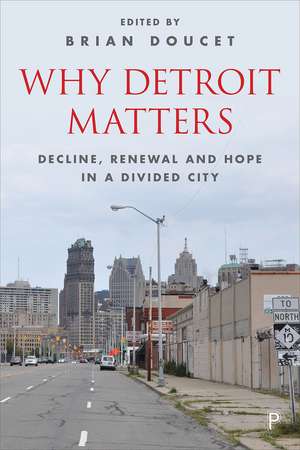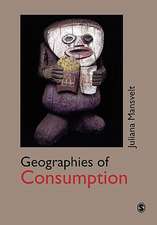Why Detroit Matters: Decline, Renewal and Hope in a Divided City
Editat de Brian Douceten Limba Engleză Paperback – 5 apr 2017
The decline of Motor City, USA, may simply seem to be symptomatic of the decline of industrial cities across the world. But as this book shows us, what happens in Detroit matters for other cities globally—and always has. Why Detroit Matters bridges the academic and nonacademic worlds to examine how the story of Detroit offers powerful and universally applicable lessons on urban decline, planning, urban development, race relations, revitalization, and governance.
Reflecting the diversity of the city, Why Detroit Matters includes contributions both from leading scholars and some of the city’s most influential writers, planners, artists, and activists—including author George Galster, activist and author Grace Lee Boggs, author John Gallagher, and artist Tyree Guyton—who have all contributed chapters drawing on their rich experience and ideas. Also featuring edited transcripts of interviews with prominent visionaries who are developing innovative solutions to the challenges in Detroit, this book will be of keen interest to urban scholars and students in a variety of disciplines—from geography to economics, sociology, and urban and planning studies—as well as practitioners, including urban and regional planners, urban designers, community activists, and politicians and policy makers. Detroit, this book makes clear, could be a model of renewal and hope for the many cities suffering from similar problems, both in America and beyond.
Reflecting the diversity of the city, Why Detroit Matters includes contributions both from leading scholars and some of the city’s most influential writers, planners, artists, and activists—including author George Galster, activist and author Grace Lee Boggs, author John Gallagher, and artist Tyree Guyton—who have all contributed chapters drawing on their rich experience and ideas. Also featuring edited transcripts of interviews with prominent visionaries who are developing innovative solutions to the challenges in Detroit, this book will be of keen interest to urban scholars and students in a variety of disciplines—from geography to economics, sociology, and urban and planning studies—as well as practitioners, including urban and regional planners, urban designers, community activists, and politicians and policy makers. Detroit, this book makes clear, could be a model of renewal and hope for the many cities suffering from similar problems, both in America and beyond.
| Toate formatele și edițiile | Preț | Express |
|---|---|---|
| Paperback (1) | 336.81 lei 3-5 săpt. | |
| Bristol University Press – 5 apr 2017 | 336.81 lei 3-5 săpt. | |
| Hardback (1) | 837.85 lei 6-8 săpt. | |
| Bristol University Press – 5 apr 2017 | 837.85 lei 6-8 săpt. |
Preț: 336.81 lei
Nou
Puncte Express: 505
Preț estimativ în valută:
64.45€ • 67.47$ • 53.33£
64.45€ • 67.47$ • 53.33£
Carte disponibilă
Livrare economică 15-29 martie
Preluare comenzi: 021 569.72.76
Specificații
ISBN-13: 9781447327875
ISBN-10: 144732787X
Pagini: 304
Dimensiuni: 159 x 235 x 25 mm
Greutate: 0.64 kg
Editura: Bristol University Press
Colecția Policy Press
ISBN-10: 144732787X
Pagini: 304
Dimensiuni: 159 x 235 x 25 mm
Greutate: 0.64 kg
Editura: Bristol University Press
Colecția Policy Press
Notă biografică
Brian Doucet is a senior lecturer in the Department of Social and Behavioural Sciences at Erasmus University College in Rotterdam. Starting July 2017, Doucet will be associate professor in the School of Planning at the University of Waterloo, Canada.
Cuprins
List of contributors
List of figures and tables
Acknowledgments
one Introduction: why Detroit matters
Brian Doucet
Section One: Lessons from Detroit
two Detroit’s bankruptcy: treating the symptom, not the cause
George Galster
three Detroit in bankruptcy: what are the lessons to be learned?
Reynolds Farley
four Between economic revival and social disruption: the redevelopment of Greater Downtown and the emergence of new socio-spatial inequalities
René Kreichauf
five A new urban medicine show: on the limits of blight remediation
Joshua Akers
six Reshaping the gray spaces: resident self-provisioning and urban form in Detroit
Kimberley Kinder
seven Preserving Detroit by preserving its baseball history
Jason Roche
eight This is (not) Detroit: projecting the future of Germany’s Ruhr region
Julia Sattler
Intermezzo I: You may not know my Detroit
jessica Care moore
Section Two: Practices from Detroit
nine Evolution of municipal government in Detroit
John Gallagher
ten Detroit’s emerging innovation in urban infrastructure: how liabilities become assets for energy, water, industry, and informatics
Dan Kinkead
eleven Visions in conflict: a city of possibilities
Sharon Howell and Richard Feldman
twelve Reconstructing Detroit: the resilient city
Khalil Ligon
thirteen Reawakening culture among Detroit’s resident majority
Jessica Brooke Williams
fourteen Make sure you are helping: experts, solidarity, and effective partnering with locals
Drew Philp
fifteen New Strategies DMC, takin’ it all back home: lessons from Detroit for arts practices in the Netherlands
Friso Wiersum, Bart Witte, and Nikos Doulos
Intermezzo II: My Detroit
Tyree Guyton
Section Three: Conversations from Detroit
sixteen Lowell Boileau
Artist and founder of DetroitYES
seventeen Sandra Hines
Detroit Coalition Against Police Brutality
eighteen Malik Yakini
Detroit Black Community Food Security Network
nineteen Dan Carmody
Eastern Market Corporation
twenty Jackie Victor
Avalon International Breads
twenty-one Phil Cooley
Entrepreneur, owner of Slows Bar-B-Q and Ponyride
twenty-two Wayne Curtis and Myrtle Thompson-Curtis
Feedom Freedom Farmers
twenty-three Julia Putnam, Amanda Rosman, and Marisol Teachworth
The James and Grace Lee Boggs School
twenty-four Yusef Bunchy Shakur
Author and neighbourhood organizer
twenty-five Grace Lee Boggs
Activist (1915–2015)
twenty-six Conclusion: Detroit and the future of the city
Brian Doucet
References
Index
List of figures and tables
Acknowledgments
one Introduction: why Detroit matters
Brian Doucet
Section One: Lessons from Detroit
two Detroit’s bankruptcy: treating the symptom, not the cause
George Galster
three Detroit in bankruptcy: what are the lessons to be learned?
Reynolds Farley
four Between economic revival and social disruption: the redevelopment of Greater Downtown and the emergence of new socio-spatial inequalities
René Kreichauf
five A new urban medicine show: on the limits of blight remediation
Joshua Akers
six Reshaping the gray spaces: resident self-provisioning and urban form in Detroit
Kimberley Kinder
seven Preserving Detroit by preserving its baseball history
Jason Roche
eight This is (not) Detroit: projecting the future of Germany’s Ruhr region
Julia Sattler
Intermezzo I: You may not know my Detroit
jessica Care moore
Section Two: Practices from Detroit
nine Evolution of municipal government in Detroit
John Gallagher
ten Detroit’s emerging innovation in urban infrastructure: how liabilities become assets for energy, water, industry, and informatics
Dan Kinkead
eleven Visions in conflict: a city of possibilities
Sharon Howell and Richard Feldman
twelve Reconstructing Detroit: the resilient city
Khalil Ligon
thirteen Reawakening culture among Detroit’s resident majority
Jessica Brooke Williams
fourteen Make sure you are helping: experts, solidarity, and effective partnering with locals
Drew Philp
fifteen New Strategies DMC, takin’ it all back home: lessons from Detroit for arts practices in the Netherlands
Friso Wiersum, Bart Witte, and Nikos Doulos
Intermezzo II: My Detroit
Tyree Guyton
Section Three: Conversations from Detroit
sixteen Lowell Boileau
Artist and founder of DetroitYES
seventeen Sandra Hines
Detroit Coalition Against Police Brutality
eighteen Malik Yakini
Detroit Black Community Food Security Network
nineteen Dan Carmody
Eastern Market Corporation
twenty Jackie Victor
Avalon International Breads
twenty-one Phil Cooley
Entrepreneur, owner of Slows Bar-B-Q and Ponyride
twenty-two Wayne Curtis and Myrtle Thompson-Curtis
Feedom Freedom Farmers
twenty-three Julia Putnam, Amanda Rosman, and Marisol Teachworth
The James and Grace Lee Boggs School
twenty-four Yusef Bunchy Shakur
Author and neighbourhood organizer
twenty-five Grace Lee Boggs
Activist (1915–2015)
twenty-six Conclusion: Detroit and the future of the city
Brian Doucet
References
Index
Recenzii
"This is an important and unique book in the context of the future of cities globally. In considering Detroit as a symbol of aspects of post-industrial decline and regeneration, it gives voice to a range of normally excluded voices and narratives. It therefore provides a valuably rounded set of perspectives and visions which, together, help the reader to understand the forces that have shaped the city, and wider lessons for creating more inclusive cities."
"Encompassing a wide range of views from academics (European and US) as well as neighborhood activists and artists, the book could excite lively discussions in urban studies and urban planning classes. The contributors explore the role of race, class, and post-industrialism in Detroit’s devolution and critique neoliberal policy by juxtaposing disinvestment in city neighborhoods against Quicken Loans–spurred downtown revival."
“This is a most welcome addition to the growing body of literature that not only is bringing long overdue attention to Detroit but also seeks to provide much needed nuance and complexity to Manichean debates. Doucet challenges readers to dissect the conscious choices that led Detroit into and out of bankruptcy rather than accept what transpired as inevitable.”












